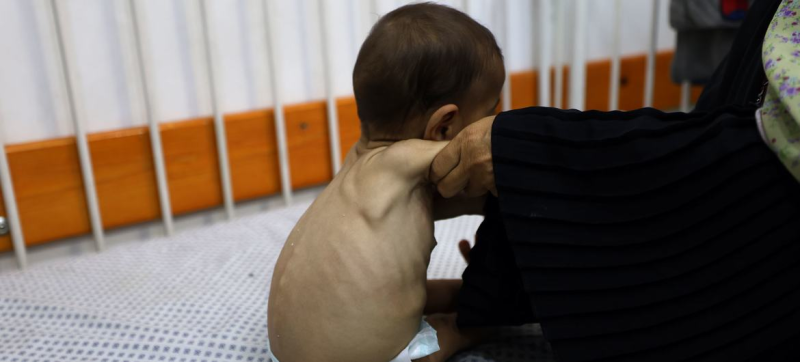- India Sees 9% Drop in Foreign Tourists as Bangladesh Visits Plunge |
- Dhaka Urges Restraint in Pakistan-Afghan War |
- Guterres Urges Action on Safe Migration Pact |
- OpenAI Raises $110B in Amazon-Led Funding |
- Puppet show enchants Children as Boi Mela comes alive on day 2 |
No One Should Risk Death to Find Food in Gaza: UN

A severely malnourished child is treated in a hospital in Gaza.
As Gaza faces famine-like conditions, large numbers of people reportedly continue to be killed and injured while searching for food, the UN Office for the Coordination of Humanitarian Affairs (OCHA) said on Friday.
The months-long deprivation of most life-sustaining basic goods has deepened the crisis. More than 100 people have been killed and hundreds of others injured along food convoy routes and near Israeli-militarised distribution hubs in the past two days alone.
With one in three people currently going days without food, OCHA reiterated that no one should ever be forced to risk their life just to eat.
Ted Chaiban, Deputy Director of the UN children’s agency UNICEF, who recently visited Gaza, said, “The marks of deep suffering and hunger were visible on the faces of families and children.”
He was briefing journalists in New York about his five-day visit to Gaza, the West Bank, and Israel.
“Gaza now faces a grave risk of famine,” he said, adding, “This has been building for some time, but now we have two indicators that exceed the famine threshold.”
The crisis can only be addressed through the unrestricted flow of aid into Gaza, alongside commercial supplies to meet people’s needs.
Nearly a week after Israel announced plans to scale up aid and implement tactical pauses for UN convoy movement, OCHA reported that the aid reaching Gaza remains insufficient. UN convoys continue to face impediments and dangers along the routes provided by Israeli authorities.
“Civilians must always be protected, and community-level aid delivery at scale must be facilitated, not obstructed,” OCHA said.
“The children I met are not victims of a natural disaster. They are being starved, bombed, and displaced,” said Chaiban. He noted that over 18,000 children have been killed since the war began — an average of 28 children a day, “the size of a classroom — gone.”
While in Gaza, Chaiban met with families of the 10 children killed and 19 injured by an Israeli airstrike while queuing for food at a UNICEF-supported nutrition clinic in Deir Al-Balah.
During talks with Israeli officials in Jerusalem and Tel Aviv, UNICEF “pressed for a review of [Israel’s] military rules of engagement to protect civilians and children,” Chaiban said.
UNICEF also called for increased humanitarian aid and commercial traffic to stabilise the situation and reduce the population’s desperation.
“Children should not be getting killed while waiting in line at a nutrition centre or collecting water. People should not be so desperate as to rush a convoy,” he added.
“What is happening on the ground is inhumane,” Chaiban concluded, expressing hope for a sustained ceasefire and a political resolution.

